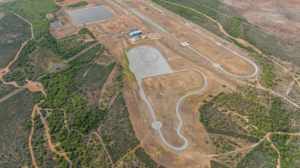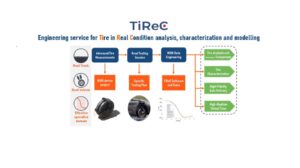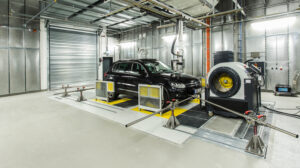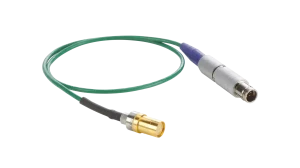Industry News
Smithers earns ISO 17025 accreditation at Texas proving ground
Smithers has earned ISO 17025 accreditation for its proving ground at Treadwell Research Park in Pearsall, Texas. The company operates the proving ground on behalf of Discount Tire.
The scope of accreditation for the site includes wet grip testing and tire buffing. Preparations to add other test methods, such as rolling resistance and pass-by-noise, to the accreditation are in progress.
“The tire industry is currently focused on a variety of sustainability initiatives, such as reducing the rate of tread wear to extend the life of the tire,” said Sean Connolly, director of test track operations at Smithers Winter Test Center/Pearsall Test Track.
First-of-its-kind device captures tire forces in real-world conditions
New measurement technology from WOM Testing Technologies now makes it possible to directly capture tire behavior in real-world conditions. We sit down with Carlos Nerini, the company’s managing director and co-founder, to discuss how the solution came to life
For over 70 years, tire and chassis system modeling has depended largely on indoor testing. However, these controlled environments fall short in replicating real-world conditions, especially on snow and ice, where indoor testing faces serious limitations.
The rigorous quality assessment behind every Bugatti W16 Mistral
Bugatti demands nothing less than perfection from each example of its Bugatti W16 Mistral, which undergoes an exhaustive and uncompromising quality assessment process before it is delivered to its owner. At the heart of the testing exercise lies a protocol that subjects each vehicle to a minimum of 400km of evaluation across the diverse landscapes of Alsace, ensuring that every example meets the high standards of the marque.
A 350km test route through the picturesque Alsatian countryside serves as an amphitheater for evaluating the W16 Mistral’s capabilities.
Testing for recall: Why OEMs need QA that anticipates failures
From Honda’s faulty brake pedals to Mitsubishi’s frozen camera displays and Citroën’s defective Takata airbags, 2025 has made one thing clear: recalls are still catching OEMs off guard. Despite advances in simulation and test automation, defects are slipping through validation and only surfacing once they’ve reached the customer, or worse, the crash scene
These issues aren’t just technical glitches. They’re symptoms of a testing culture still rooted in linear production cycles, where quality assurance is seen as the last hurdle before sign-off, not the intelligent filter it should be.
ALEE approved for all vehicle categories and test scopes
The Alliance des laboratoires d’essai européenne (ALEE) has been officially designated for all test scopes defined by the Kraftfahrt-Bundesamt (KBA), covering 651 approved test procedures across the full range of UN/EU and German regulations.
With this expansion, ALEE is authorized to conduct whole vehicle type approvals and individual approvals for all vehicle categories – including passenger cars, agricultural vehicles, motorcycles, trailers and trucks.
The expanded designation enables ALEE to carry out type approvals under the following EU framework regulations: passenger cars, buses, trucks, trailers under regulation (EU) 2018/858; agricultural and forestry tractors, trailers, etc.
Kistler launches absolute pressure sensor for hydrogen pressure measurements
Kistler has launched the 4012A absolute pressure sensor for hydrogen pressure measurements, designed to deliver reliable measurements to optimize hydrogen-fueled combustion engines and for pressure monitoring in fuel cells. The sensor has demonstrated high hydrogen resilience through testing.
The growth of a large-scale hydrogen economy poses challenges for measurement technology. Hydrogen diffusion and accumulation can cause material embrittlement, while infiltration into sensor elements may distort measurement accuracy.
Combustion engines operated with hydrogen or alternative H2-based fuels are almost emission-free, paving the way for decarbonized mobility – with engine developers using hydrogen-resistant sensors to optimize hydrogen combustion – and Kistler’s hydrogen pressure sensor has been designed to support this mobility transition.
Comemso launches automated calibrator for battery cell simulator
Comemso electronics has launched SmartCal, a solution for calibrating and adjusting its in-house battery cell simulator (BCS). The system has been designed for developers and testers of battery management systems (BMS) to enable fully automated calibration of the Comemso BCS, at the customer’s premises or in the Comemso laboratory.
SmartCal combines intuitive user guidance with an automated calibration process. It uses a 6.5-digit digital multimeter that is calibrated in accordance with ISO 17025.
LDRA joins Renesas Ready Partner Network and R-Car Consortium to accelerate safety-critical software development
LDRA has announced it has joined both the Renesas Ready Partner Network and the R-Car Consortium. This collaboration expands LDRA’s support to include system development using Renesas R-Car system on a chip (SoCs), microprocessors (MPUs) and microcontrollers (MCUs) that must comply with industry-wide functional safety and cybersecurity standards.
“Joining the Renesas Ready Partner Network and R-Car Consortium enables us to work directly within the Renesas ecosystem to help development teams tackle real-world functional safety verification challenges,” said Ian Hennell, operations director, LDRA.








